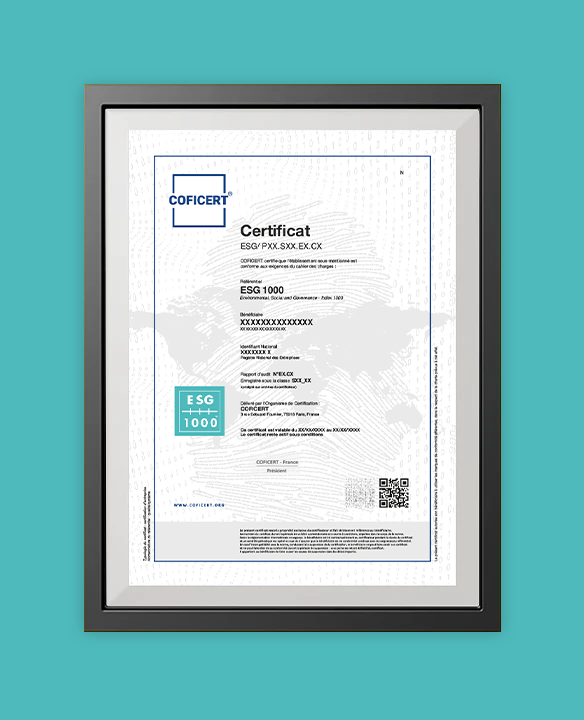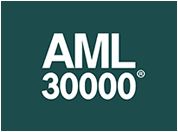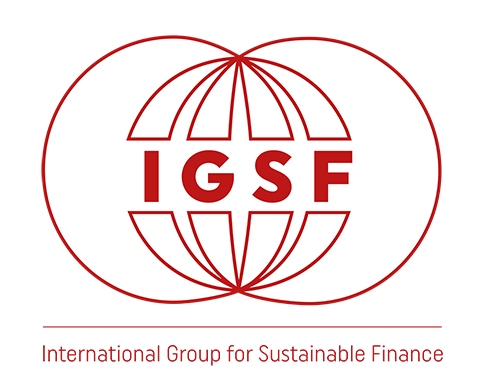ESG 1000
Non-Financial Corporate Governance
La certification est dédiée à la lutte contre le blanchiment d’argent et le financement du terrorisme
- L’ensemble des mesures devant être prises dans le domaine LBA/ FTP par les institutions financières (IFs) et certaines catégories d’entreprises et de professions non-financières (EPNFs), désignées comme « personnes assujetties » par le GAFI.
- La méthodologie à suivre pour évaluer le niveau de conformité technique et d’effectivité des dispositifs LBA/FTP mis en place par lesdites institutions, entreprises, ou autres professions assujetties.
Certification dedicated to the evaluation of non-financial governance.
The ESG 1000®, for Economy, Sustainability, Governance – Index 1000, is the international certification standard for non-financial governance systems, previously referred to as “CSR management systems”.
The ESG 1000® sets the guidelines that can be used by an entity to structure and improve its social, ethical, environmental, and governance practices with the aim of fostering sustainable development.
The ESG 1000® international standard is a certifiable standard applicable to all companies and organizations, regardless of their business sector. Certification under the ESG 1000® standard aims to ensure that the management system promotes the widespread adoption of best practices in non-financial governance.
The standard allows entities to measure their non-financial performance, evaluate the consistency between their stated objectives and observed behaviors, and place these results into perspective with regard to their economic performance.
The standard is regulated and distributed by the IGSF

For certification recipients, in their environment
From an internal perspective
- Continuously ensure the relevance and effectiveness of the implemented non-financial governance system
- Promote and strengthen a culture of compliance and performance in non-financial governance, by highlighting:
- The importance of the challenges associated with ensuring the long-term viability of established economic models and their capacity to operate within a sustainable development framework
- The risks incurred, notably with regard to reputation, sanctions, and even the entity’s long-term viability, in the event of shortcomings or the absence of a comprehensive and effective framework
- Ensure the continuous improvement of the management system by:
- Identifying weaknesses and addressing them through the implementation of appropriate action plans
- Consolidating the strengths
- Guarantee that the governance system remains compliant with the latest updates and recommendations of the standard, in line with current international regulations
- Improve best practices in terms of non-financial governance
From an external perspective
- Certification to the ESG 1000® standard provides a reliable and concrete benchmark for economic and financial operators, enabling them to differentiate companies in fulfilling their due diligence obligations
- The ESG 1000® certification is a strong argument that reflects and validates compliance with a comprehensive set of global performance requirements
- Compliance with the ESG 1000® standard reflects commitment to ethical, social, environmental, and governance practices
- The use of the ESG 1000® compliance serves as an indicator that directly contributes to the value-creation process of the certified entity
- The use of the ESG 1000® compliance marks provides a competitive advantage and constitutes a solid negotiation leverage with stakeholders
- Certification is a key element in strengthening brand image, facilitating access to investment and financing opportunities
Steps of the ESG 1000 Certification Process
The certification process is carried out in two stages: first, an evaluation to assess the compliance of an evolving system, at a given point in time, with a set of non-financial governance criteria; then, if compliance is validated, the ESG 1000® certificate is issued by a duly accredited third-party certification body.
The specifications of the ESG 1000® standard describe:
- The set of measures to be implemented by companies or institutions in terms of non-financial governance
- The methods used to assess the level of compliance and effectiveness of the management system, for the purpose of ESG 1000® certification
The evaluation process begins with a meeting introducing the methodology employed and the execution schedule.
Review of the technical compliance, followed by the effectiveness of the non-financial governance measures adopted by the evaluated entity. This involves gathering all necessary information from the entity using specific audit techniques with regard to the information being collected, such as documentary review, interviews, site visits, information system review, etc.
These assessments focus on verifying several factors, including governance structure, the ability to develop effective strategies and make commitments, the completeness and relevance of the materiality matrix under an IRO (Impacts, Risks, and Opportunities) approach, the implementation of emissions reports and their scope, the evaluation of adopted policies (in areas such as products, business relationships, environment, human capital, human rights, etc.), as well as the implementation of appropriate mechanisms for control, risk prevention, and monitoring, among others.
The technical compliance and effectiveness of the systems are then assessed for each requirement outlined in the ESG 1000® specifications, using a weighted rating system. This step allows for the evaluation of the quality of the non-financial governance system in order to determine its eligibility for certification.
The certification committee is responsible for ensuring the proper execution of evaluations in accordance with the rules and procedures established for this purpose, in compliance with ISO 17021®. It then determines the compliance status of the entity undergoing the evaluation.
If compliance is confirmed at the end of the evaluation process, a certificate of compliance is then issued.
Would you like to know more about our certification standards ?
Get in touch with our experts and discuss your company’s readiness for certification at no cost.

